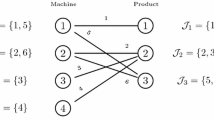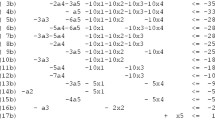Abstract
We address the short-term production planning and scheduling problem coming from the glass container industry. A furnace melts the glass that is distributed to a set of parallel molding machines. Both furnace and machine idleness are not allowed. The resulting multi-machine multi-item continuous setup lotsizing problem with a common resource has sequence-dependent setup times and costs. Production losses are penalized in the objective function since we deal with a capital intensive industry. We present two mixed integer programming formulations for this problem, which are reduced to a network flow type problem. The two formulations are improved by adding valid inequalities that lead to good lower bounds. We rely on a Lagrangian decomposition based heuristic for generating good feasible solutions. We report computational experiments for randomly generated instances and for real-life data on the aforementioned problem, as well as on a discrete lotsizing and scheduling version.
Similar content being viewed by others
References
Ahuja, R.K., Magnanti, T.L., Orlin, J.B.: Network Flows: Theory, Algorithms, and Applications. Prentice-Hall, Englewood Cliffs (1993)
Almada-Lobo, B., Oliveira, J.F., Carravilla, M.A.: Production planning and scheduling in the glass container industry: A VNS approach. Int. J. Prod. Econ. 114, 363–375 (2008)
Almada-Lobo, B., Klabjan, D., Carravilla, M.A., Oliveira, J.F.: Single machine multi-product capacitated lotsizing with sequence-dependent setups. Int. J. Prod. Res. 45, 4873–4894 (2007)
Bertsekas, D.P.: Network Optimization: Continuous and Discrete Models. Athena Scientific, Belmont (1998)
Constantino, M.: A polyhedral approach to a production planning problem. Ann. Oper. Res. 96, 75–95 (2000)
Dematta, R., Guignard, M.: Dynamic production scheduling for a process industry. Oper. Res. 42, 492–503 (1994)
Dematta, R., Guignard, M.: Studying the effects of production loss due to setup in dynamic production scheduling. Eur. J. Oper. Res. 72, 62–73 (1994)
Dematta, R., Guignard, M.: The performance of rolling production schedules in a process industry. IIE Trans. 27, 564–573 (1995)
Drexl, A., Kimms, A.: Lot sizing and scheduling—Survey and extensions. Eur. J. Oper. Res. 99, 221–235 (1997)
Fleischmann, B.: The discrete lot-sizing and scheduling problem with sequence-dependent setup costs. Eur. J. Oper. Res. 75, 395–404 (1994)
Geoffrion, A.M.: Lagrangian relaxation for integer programming. Math. Program. Study 2, 82–114 (1974)
Held, M., Wolfe, P., Crowder, H.P.: Validation of subgradient optimization. Math. Program. 6, 62–88 (1974)
Hindi, K.S.: Solving the single-item, capacitated dynamic lot-sizing problem with startup and reservation costs by tabu search. Comput. Ind. Eng. 28, 701–707 (1995)
Jans, R., Degraeve, Z.: An industrial extension of the discrete lot-sizing and scheduling problem. IIE Trans. 36, 47–58 (2004)
Jans, R., Degraeve, Z.: Meta-heuristics for dynamic lot sizing: A review and comparison of solution approaches. Eur. J. Oper. Res. 177, 1855–1875 (2007)
Karmarkar, U.S., Kekre, S., Kekre, S.: The dynamic lot-sizing problem with startup and reservation costs. Oper. Res. 35, 389–398 (1987)
Karmarkar, U.S., Schrage, L.: The deterministic dynamic product cycling problem. Oper. Res. 33, 326–345 (1985)
Pochet, Y., Wolsey, L.A.: Production Planning by Mixed Integer Programming. Springer, New York (2006)
Salomon, M., Solomon, M.M., Van Wassenhove, L.N., Dumas, Y., Dauzere-Peres, S.: Solving the discrete lotsizing and scheduling problem with sequence dependent set-up costs and set-up times using the Travelling Salesman Problem with time windows. Eur. J. Oper. Res. 100, 494–513 (1997)
Sandbothe, R.A.: A user interactive heuristic procedure for solving the multiple product cycling problem. Comput. Oper. Res. 23, 897–907 (1996)
Vanderbeck, F.: Lot-sizing with start-up times. Manag. Sci. 44, 1409–1425 (1998)
Wolsey, L.A.: MIP modelling of changeovers in production planning and scheduling problems. Eur. J. Oper. Res. 99, 154–165 (1997)
Author information
Authors and Affiliations
Corresponding author
Rights and permissions
About this article
Cite this article
Almada-Lobo, B., Klabjan, D., Carravilla, M.A. et al. Multiple machine continuous setup lotsizing with sequence-dependent setups. Comput Optim Appl 47, 529–552 (2010). https://doi.org/10.1007/s10589-009-9235-8
Received:
Revised:
Published:
Issue Date:
DOI: https://doi.org/10.1007/s10589-009-9235-8




